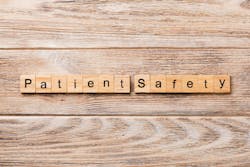A 2022 report from the U.S. Department of Health and Human Services (HHS) Office of the Inspector General found that 25 percent of Medicare patients were harmed during hospital stays in October 2018, and 43 percent of those were preventable. The National Quality Forum (NQF) has launched a patient safety initiative to address the high rates of avoidable medical errors and preventable patient harms that continue despite decades of efforts to remediate these events.
The Focus on HARM (Harmonizing Accountability in Reporting and Monitoring) initiative will begin by re-examining the most egregious events, often referred to as “Never Events” because they should never occur in healthcare. These events were first defined by the nonprofit NQF in 2002 with the introduction of the Serious Reportable Event (SRE) list.
The list, maintained through periodic updates, is used by national and state-based event reporting systems to increase accountability and improve patient safety. Currently, 28 states and the District of Columbia use the SRE list or elements of it for mandatory accountability reporting.
NQF stated that Focus on HARM aims to reduce preventable harm by first modernizing the criteria for what constitutes an SRE and aligning standards for reporting such events across different accountability systems—an essential step to strengthen efforts to pinpoint and address the causes of preventable harm.
In its recent Report on Transforming Patient Safety, the President’s Council of Advisors on Technology and Science (PCAST) underscored the urgent need to upgrade public reporting of serious, avoidable harm events as a national priority for patient safety improvement. With NQF’s long history serving as a public-private partnership and support from Elevance Health as the launching sponsor, the initiative will address this need, first by engaging a diverse range of healthcare stakeholders to develop consensus on updating and modernizing the SRE list.
“The root causes of avoidable patient harm events are most often systemic failures,” said NQF Board Member Dora Hughes, M.D., M.P.H., acting chief medical officer and acting director of the Center for Clinical Standards and Quality (CCSQ) for the Centers for Medicare & Medicaid Services (CMS), in a statement. “Reducing preventable harm to patients starts with having accurate data so that common, recurring systemic problems contributing to harm events can be quickly identified and addressed.”
The project also aims to reduce the burden on providers of multiple, differing, unaligned patient safety event reporting structures by developing consensus on common reporting standards. NQF will convene a broad array of stakeholders to establish a consensus-based, unified framework for harmonizing the taxonomies used to track and report patient safety events.
“Currently, different reporting systems may require a hospital or other healthcare provider to report a single patient harm event to multiple entities in multiple, different formats, creating additional administrative burden on health systems but doing little to improve patient safety,” said Shantanu Agrawal, M.D., MPhil, chief health officer at Elevance Health, in a statement. “Streamlining taxonomies will help reduce inconsistencies in the data that currently hinder efforts to track, compare, and reduce preventable harm—all critical steps necessary to improve accountability.”
Building on the updated SRE list and taxonomy framework, in the next stage of work, NQF said it would convene multi-stakeholder experts to develop novel approaches that sustainably improve accountability for patient safety and harm reduction. The findings and consensus-based recommendations will be shared with healthcare systems and providers, federal and state agencies, and other organizations to bolster safety improvement efforts across healthcare settings.
Sponsored Recommendations
Sponsored Recommendations
Sponsored Content


